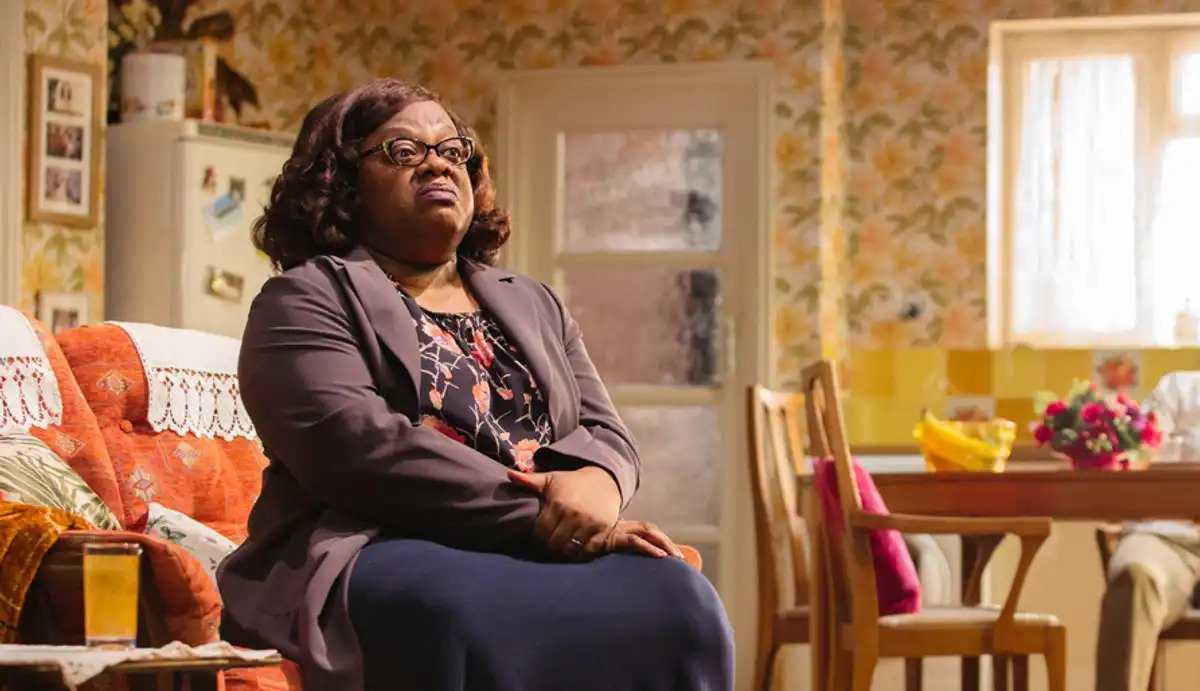The National’s Dorfman Theatre is brimming with melanated energy. I have just collected my ticket to see Natasha Gordon’s Nine Night, and judging by the size of the crowd, the show is definitely sold out. “I can’t believe I’m about to watch a play about nine night,” a black woman gushes to her friend. There is something quite unbelievable about this whole experience. For instance, a lady with a confident afro and brilliant yellow suit says hello to me and I, a Londoner, engage with ease. And then there’s Beverley Knight a few feet away buying a playtext. She smiles at me, and I eagerly smile and wave back, greeting her like the old friend she apparently is. I stop and think about where I am, and what I am about to see. This is a play with a story that is Black and British, and received the funding it deserved in order to be made. I am about to see tub of Jumbo Chicken Stock Powder onstage as a set piece. I am not used to this much blackness at the National Theatre. And I am happily amazed by it all. Natasha Gordon’s debut, wonderfully directed by Roy Alexander Weise, tells the story of a London-based Jamaican family who, after the death of their matriarch, Gloria, begin the Caribbean funerary tradition: nine night. Nine night is an extended period of festivity hosted in the house of the deceased. Food, drink, and high-proof Jamaican rum flow freely, and guests mill in and out to celebrate the life and aid in the final passing of the deceased’s spirit. With roots in a number of African religious practices, nine night may feel like a familiar event to many Black British people; I myself am used to never-ending Nigerian wake keepings with mounds of food and speaker-splitting music. But what also feels familiar to me is the kind of grief Gordon captures – particularly in Gloria’s children, Lorraine and Robert, and grandchild, Anita. In the play it is implied that, like many other members of the Windrush generation, Gloria spent most of her life in the UK working to survive, not necessarily to live, in a country that did not want her. Her children saw that, and their grief is tied up in it. Gloria’s self-sacrificing daughter Lorraine – played by Franc Ashman – left her job to tend to her dying mother. Robert, Lorraine’s brother and Gloria’s only son – played by Oliver Alvin-Wilson – is plagued by an urgent sense of duty; he must take care of his family while they are still alive. In both Lorraine and Robert, I see an anxiety as to whether they, the reason for Gloria’s struggle and sacrifice, have been enough, and a blind desperation to try and ensure themselves that they have. And in Rebekah Murrell’s Anita, Lorraine’s quick-witted, millennial daughter whose every word seems to be a proclamation or political statement, I see an attempt to connect to her cultural blackness, particularly now that her most direct bridge to it is gone. These characters do not just mourn the loss of their mother and grandmother, they also mourn the potential with which her immigrant dreams may have been more fully fulfilled. They mourn the fragments of themselves, Jamaica, that are no longer anchored in their home. Theirs is a grief that, whilst universal, feels inherently diasporic. The play’s focus also expands beyond second and third generation experiences, and beyond immigrant experiences, too. The show’s standout character is almost certainly Aunt Maggie, Gloria’s similarly-aged relation, stunningly portrayed by Cecilia Noble, whose wry commentary and expert timing provide a constant source of comic levity. Her husband is Uncle Vince, played by Ricky Fearon, whose relationship with Gloria is said to have been past platonic. Michelle Greenidge plays Trudy, Gloria’s Jamaican-born daughter who did not move over to the UK with her. Trudy’s gut-wrenching grief exposes the difficult consequences of leaving an old life to set up a new one. Lastly, Hattie Ladbury plays Sophie, Robert’s white partner who straddles the line between cultural interloper and welcomed family member. “I know this world and this family. It’s mine, it’s my neighbours, everything that I’m familiar with,” director Weise tells me during our phone conversation. I’d asked him about the weight of telling this story at the National, and whether he’d made any directorial choices that explicitly anticipated the play’s audience. “One of the things that Natasha and I were really adamant about when we first started working together [was that] we and the National had to work as hard as possible to get a black audience in to watch the play. One of our first meetings was with marketing. We haven’t had one night yet where it’s completely been your typical, white, middle-class, little-bit-older National Theatre audience. If it had been that, the play would’ve fallen flat, I think, because there are just some references that needed to land.” So often in theatre, and entertainment in general, there is a feeling that to get your work made, you must tick certain boxes for the powers that be, powers that are still disproportionately white and wealthy. It is a refreshing thing to hear, then, that a play with predominantly black characters isn’t concerned with being digestible for a white audience. Moments like the magical kumina dance scene, or whenever the Jamaican accents rendered words lost to an untrained ear, are evidence of this. Even Rajha Shakiry’s prop design – chicken wings that looked to be bagged by the local market butchers, newspaper wrapped yams from Jamaica, Jumbo seasoning – felt honest and resonant of a particular black, immigrant experience. “You know, I go and watch Shakespeare and it takes me a while to get into that language,” Weise notes. “I’ve decided that, without sounding like I’m being extremely aggressive, I no longer make work for white audiences, I make work for people.” And couched in this statement is a real sense of freedom; not in just refusing to cater to a white gaze, but also refusing to cater to every black one. Nine Night was not everyone’s cup of tea. Walking away from the theatre after seeing the play a second time, I overheard a man on the Southbank say, “It’s nine night. Other cultures will think that’s how it is. That’s not how it is. The kitchen door would never be closed!” One friend commented that the play felt like a caricature of Jamaican culture, while another was touched by its accuracy, saying that it illuminates exactly what is going on in her household after her own grandmother’s death. Not every black person has to like this play, and that’s okay. In fact, I think it is important – in spite of the fear that not liking a play with a largely black cast means never seeing black people on stage again. In order to move toward a point where the multiplicity of black voices is truly respected, that multiplicity of experience and opinion must be recognised. “I can only present my truth,” Weise tells me, touching on the complexity of his own lens, “and [I won’t make] work that is in some way emulating pre-existing understandings of what theatre and art and culture should be. I make work with my gaze of the world. And that encompasses so many different experiences: being black, being a working class man, working in theatre in a predominantly white middle class industry.” Weise also noted that playwright Gordon, with her experience as an actor, knew just how limiting roles for black actors can be, and so wanted to create characters that felt complex and truthful. It is refreshing to have black characters who are unafraid to flit in and out of behaviour deemed stereotypical, as long as they aren’t completely confined to said behaviour. “If you’re presenting these characters with integrity, as wholesomely as possible, the audience will ride with you. And some of the actors [went on] really huge journeys in terms of their portrayals of their characters. Because it is a really difficult thing sometimes to go ‘oh, is my character the shouty person that’s really angry all the time?’ Because we know that we have those stereotypes. But within a family, within a story, it’s justified. It’s about their relationships. So in a way we didn’t necessarily have the pressure of having black characters in white environments, which are often the spaces in which we become most conscious about [how] we come across.” There were some aspects of the play that could have been treated with more sensitivity. A few of the spiritual scenes felt specifically delivered for laughs, as if they were structured with extreme self-consciousness, placing limits on how seriously we should take practices originating from African Caribbean cultures. And there were also times where the comedy of the play, though integral to its performance of grief, overshadowed the complexity with which certain characters experienced said grief. I’m thinking of Aunt Maggie specifically, who did not have much space to explore her pain outside of ways that we as an audience were primed to laugh at. Without giving away too much of the story, her specific grief is complex: it is bound up in unrequited emotion, genuine non-performative care, and the quintessential older-black-generation propensity to perform contentment. But even in her quiet, solitary moments, her pain never felt earnestly received. This could very easily say more about the audience – and how we are conditioned to receive older, full-figured, loud, dark-skinned black women – than the production itself. Though perhaps both the audience and the production are complicit in upholding a set of ideas around strong, invulnerable black women, and in not allowing much room to explore the ways we inevitably break down. It still feels sacred to be racially represented at the theatre, and that sacredness makes it easy to look for connection with any black character on stage. It also makes it easy to push these characters into the black universal, to want them to tell all of our stories, instead of just their own. As our conversation came to a close, Weise shared his hope that we all keep questioning and interrogating what we mean by a ‘black play,’ particularly when thinking about plays with characters who are unashamedly black, but whose blackness is not the actual subject. I agree that that is an important question for all of us to meditate on, now that more of our stories are being told. In our stories, we should be able to explore our complexities, our emotions, and the myriad of ways we relate to the people around us. In our stories, we should be able to exist completely, without any racialised limits. Nine Night is a very important piece of theatre, and not just because it is a play with an almost entirely black cast that has sold out night after night. It is important because it beautifully highlights one family’s experience of rituals that are specifically black by exploring an emotion, grief, that is truly universal. Nine Night is on at the National Theatre until 26th May 2018.
Loss, laughter and resisting the black universal: Nine Night at the National Theatre

Skin Deep’s Nkenna Akunna meets Roy Alexander Weise to talk about his play Nine Night, currently on at the National Theatre, London.





